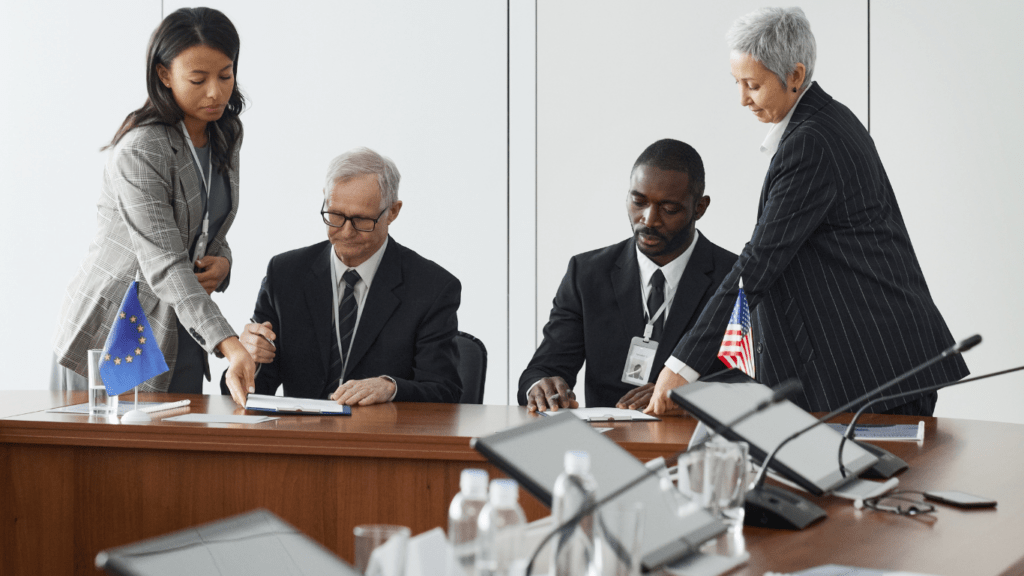Overview Of World Leaders In The News
Prominent world leaders often dominate headlines due to their significant roles in international affairs. For instance, Joe Biden has been pivotal in implementing economic reforms in the U.S., focusing on infrastructure and social welfare programs. Similarly, Xi Jinping’s policies have major global implications, particularly in trade and technology sectors. Vladimir Putin’s actions in Ukraine have far-reaching consequences, affecting geopolitical stability.
In Europe, Emmanuel Macron’s leadership impacts EU policies, especially in terms of climate initiatives and economic strategies. Angela Merkel, though no longer serving as Germany’s Chancellor, still influences political discourse and international relations. In Latin America, Jair Bolsonaro’s approaches to environmental policies spark global discussions, especially concerning the Amazon rainforest.
These world leaders, through their decisions and actions, play critical roles in shaping global narratives and influencing policies across various domains.
Most Influential World Leaders
World leaders make headlines for their significant roles in shaping global events and policies. Let’s delve into their political impact and economic policies.
Political Impact
Joe Biden implements significant policy changes in the U.S., impacting both domestic and international spheres. His administration focuses on restoring alliances and addressing climate change.
Xi Jinping’s leadership in China drives major geopolitical strategies, influencing global trade and regional security. Vladimir Putin’s maneuvers in Ukraine and other regions shape geopolitical stability and fuel international discussions.
Emmanuel Macron impacts EU policy, driving initiatives in climate, technology, and economic reforms. Despite stepping down, Angela Merkel continues to influence German politics and the broader European discourse. Jair Bolsonaro’s presidency in Brazil sparks conversations internationally concerning environmental policies and deforestation in the Amazon.
Economic Policies
Biden’s economic policies aim to rebuild the U.S. economy through infrastructure investments and reformed tax codes. This strategy seeks to close the gap between rich and poor.
Xi Jinping prioritizes economic self-reliance and technological advancement in China. His policies aim to reduce dependence on foreign technologies and promote innovation. Putin’s economic strategies revolve around energy exports, with Russia’s economy heavily reliant on oil and gas revenues. Macron’s economic reforms target labor laws and pension systems in France to enhance competitiveness within the EU.
Merkel’s tenure left a legacy of fiscal prudence and robust financial systems that continue to guide Germany’s economic policies. Bolsonaro’s economic approach focuses on privatizations and deregulation in Brazil, promoting business-friendly environments despite criticisms over environmental governance.
Emerging Leaders And Rising Stars

I constantly monitor emerging leaders and rising stars making waves on the global stage. These leaders often bring fresh perspectives and innovative ideas that challenge the status quo.
New Faces In Global Politics
Several new faces in global politics have started garnering attention. For instance, Jacinda Ardern has become a notable figure due to her compassionate leadership and efficient handling of crises like the COVID-19 pandemic in New Zealand.
Another example is Sanna Marin of Finland, who, at just 34, became the world’s youngest serving prime minister, emphasizing social equality and climate action.
In Africa, Abiy Ahmed of Ethiopia has made headlines for his peace initiatives and economic reforms, earning him the Nobel Peace Prize in 2019. These leaders represent the changing dynamics and fresh outlooks in international politics.
Leadership Styles
- Emerging leaders showcase diverse leadership styles that reflect their unique backgrounds and philosophies.
- Ardern’s empathetic and inclusive approach contrasts with the more technocratic style of Marin, who focuses on pragmatic policy changes.
- Ahmed’s leadership blends visionary ideas with a strong emphasis on reconciliation and development.
- These varied styles demonstrate that there isn’t a one-size-fits-all approach to effective leadership.
- Leaders like Ardern, Marin, and Ahmed are redefining how leadership can be executed in the modern world, integrating empathy, pragmatism, and vision to navigate their countries through complex global challenges.
Controversial Figures
Controversial figures often dominate headlines due to scandals and public criticism. Their actions and policies provoke strong reactions globally.
Scandal And Criticism
Political scandals affect reputations and lead to widespread criticism. For instance, Vladimir Putin faces accusations over electoral interference and allegations concerning human rights abuses.
Similarly, Jair Bolsonaro’s handling of the COVID-19 pandemic and environmental regulations in the Amazon has drawn significant international condemnation.
Another example is Boris Johnson, whose leadership during Brexit negotiations and responses to party-related scandals have been heavily scrutinized. These controversies intensify media focus on these leaders, impacting their political standing and influencing global perceptions.
Public Perception
Public perception shapes a leader’s legacy and their ability to govern. Xi Jinping’s stringent policies on Hong Kong and the Uyghur population generate polarized views, with some supporters endorsing his vision of economic advancement and critics decrying his methods.
In the United States, Joe Biden’s approval ratings oscillate with his handling of domestic and international issues, reflecting a nation divided on his performance.
Emmanuel Macron faces mixed reactions in France, particularly regarding labor reforms and his approach to the Yellow Vest protests. These varying perceptions highlight the complex dynamics world leaders navigate as they address multifaceted challenges on the global stage.
Leaders Promoting International Collaboration
Collaborating internationally has become a key focus for many global leaders. They aim to address pressing issues through diplomatic efforts and global initiatives, emphasizing the importance of unity and collective action.
Diplomatic Efforts
World leaders often engage in diplomatic efforts to resolve conflicts and strengthen international relations. Joe Biden places significant emphasis on restoring alliances with traditional U.S. allies. His administration prioritizes re-engaging with NATO and reinstating the U.S. in international agreements like the Paris Climate Accord.
Emmanuel Macron of France advocates for a stronger European Union, emphasizing the need for an integrated approach to defense and foreign policy. Under his leadership, France participates actively in peacekeeping missions and fosters dialogue between conflicting nations.
Angela Merkel, though retired, left a lasting diplomatic legacy. She was instrumental in mediating negotiations between Russia and Ukraine and bolstered the EU’s diplomatic ties with other regions. Merkel’s efforts emphasized the importance of dialogue and compromise in maintaining stability.
Sanna Marin of Finland engages in diplomatic efforts to promote social equality and human rights. She collaborates with other Nordic countries, advocating for progressive policies on the international stage that focus on climate action, gender equality, and social justice.
Global Initiatives
Global initiatives spearheaded by world leaders address significant issues like:
- climate change
- poverty
- public health crises
Xi Jinping of China launched the Belt and Road Initiative (BRI), aiming to enhance global trade connectivity and infrastructure development across Asia, Europe, and Africa.
Jacinda Ardern of New Zealand champions initiatives targeting climate change. She advocates for sustainable development and renewable energy investments. Ardern’s leadership during the COVID-19 pandemic demonstrated the effectiveness of coordinated global health responses.
Abiy Ahmed of Ethiopia promotes economic reforms and regional peace initiatives in Africa. His efforts in the Horn of Africa, including peace negotiations with neighboring Eritrea, earned him the Nobel Peace Prize.
Jair Bolsonaro’s participation in global environmental discussions concerns many, given Amazon deforestation under his watch. However, his administration commits to several international trade agreements aimed at boosting Brazil’s economic growth.
These leaders’ diplomatic efforts and global initiatives are pivotal in addressing multifaceted global challenges. Through collaboration, they strive to create a more interconnected and resilient world.


 Paulah Simmonserly, the visionary behind News Flip Network, has built a platform that delivers timely and comprehensive news across multiple fields. With a deep passion for journalism and a commitment to keeping the public informed, Simmonserly ensures the site covers everything from global affairs to business trends, health insights, and sports updates. Her leadership emphasizes accuracy and relevance, making News Flip Network a trusted resource for readers seeking up-to-date information on the events shaping the world.
Paulah Simmonserly, the visionary behind News Flip Network, has built a platform that delivers timely and comprehensive news across multiple fields. With a deep passion for journalism and a commitment to keeping the public informed, Simmonserly ensures the site covers everything from global affairs to business trends, health insights, and sports updates. Her leadership emphasizes accuracy and relevance, making News Flip Network a trusted resource for readers seeking up-to-date information on the events shaping the world.